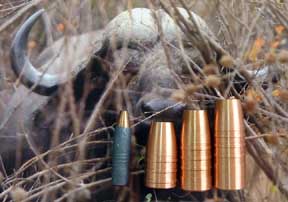

 The Accurate Reloading Forums
The Accurate Reloading Forums  THE ACCURATE RELOADING.COM FORUMS
THE ACCURATE RELOADING.COM FORUMS  Rifles
Rifles  Big Bores
Big Bores  Re: Big Bores Vs. Car Engines
Re: Big Bores Vs. Car EnginesGo  | New  | Find  | Notify  | Tools  | Reply  |  |
| one of us |
Quote: OK...time is up. The answer to the avove question is 6.28 feet and some change...2 pi to be exact. | |||
|
| one of us |
Sabot, Boy I am impressed! I am confused though about your equation for penetration and would appreciate it if you could explain this one to me, as it seems not to follow your equation. Ricochet said: Quote: A 0.429 diameter bullet of 215 grain mass has a Sectional density of ~ 0.17. He doesn't specify a muzzle velocity, but stated is was a "middling load of 4227" so I assume his muzzle velocity to be ~ 1550 fps. Using you equation => 0.17 * 1550 = 258.7. You stated, and I quote: Quote: You clearly state that the Section density * muzzle velocity must EXCEED 800 in order to penetrate and engine block. Ricochet states further that his 44 magnum load "knocked a nice hole in the water jacket of 1952 Buick Roadmaster straight-8 with". He also stated that the 30-06 and 30-30 did not penetrate at all! Factory loaded 150 grain 30-06 would be at 667 and the 30-30 150 grain factory load would be 508. So I am confused as to how the 44 Magnum load could so dramatically out penetrate the 30-06 and 30-30. Could you please enlighten me? ASS_CLOWN | |||
|
| one of us |
Sabot, You just gave me a flashback! For a second there it was 1977, and I was in advanced algebra and trig my first semester at college on the old GI bill. The instructor had a face as plain as a birch stock on a Savage rifle, but she did good things to her Levi's when she turned around and wrote equations on the chalkboard standing on her tip toes... | |||
|
| one of us |
I have owned straight 8s and to punch hole in 1 side is no great deal, You can do it with a heavy tack hammer.I have welded one that froze and it is thin in spots.But that ain't the same as going all the way though.And the 06 and 30-30 compared probably were softs.His formula is for complete penetration and out the other side I think.Ed. | |||
|
| one of us |
Ed, That may explain it! ASS_CLOWN | |||
|
| One of Us |
I'm a little skeptical of ALL these formulas flying around and wonder if they have any value in the real world of things. My experience with METAL CASTINGS has left me convinced all of them are pretty dodgy and brittle. As for shooting holes thru them, most of the time it's no big challenge. Now and then you'll get one that doesn't want to play that way. So what gun will shoot up an engine block depends on what day of the week it is...to some degree anyhow. Let's keep in mind fellows that shooting THRU an engine doesn't much matter. The engine isn't alive. If you can crack the water jacket, which 90% of the firearms will, the engine isn't going to run far. And if you can go the next step and punch thru the water jacket AND into a cylinder...then the engine has sure enough got lethal problems. The part I always got a kick out of was the bullet blowing sparks and molten metal down into the crank case.  All the old junk yard engines I've shot probably had a lot of water and crap in the oil, but they still made a lot of smoke. In a good engine, with pure oil, I reckon a guy could have a real nice fire pretty easy. All the old junk yard engines I've shot probably had a lot of water and crap in the oil, but they still made a lot of smoke. In a good engine, with pure oil, I reckon a guy could have a real nice fire pretty easy.Putting an engine out of commission with a firearm is no big trick IMHO. | |||
|
one of us |
Wow, lots of replies...  | |||
|
one of us |
Naval Armor Pnetration Formula < !--color--> http://www.battlefield.ru/guns/defin_1.html | |||
|
| Moderator |
Pecos, the one thing about all the forumlas that gets me is that engines are cast with WEBBING internals... hit a web, and there's hardly anthing that's going through a 2" thick cast... hit just the water jacket, and it'll pop.... i know that 8x57 milsurp fmj's will enter a slant 6... wont leave, but hell, what does that matter... as I said before, any reasonable hunting round, especially those normally classifed as big bores, will shoot clean through a car, from any angle, unless they hit the engine. since we are talking about taking the engine out... hell, if it hit the bellhousing, it would f**K the flywheel or TC, and that would be that in about 10,000 rpm... from front... fan, waterpump, oil pan (a 22 will cut the oil pan) valve covered, radiator, waterlines, fuel lines, plug wires.. hell, i bet there's a 50% chance that a 308 with softpoints, from the front or side, would take out a critical part, and the motor would die in a mile jeffe | |||
|
| One of Us |
Amen, Jeffe. Anyone who has ever hunted the dump grounds and junk yards will tell you engines are a piece of cake to knock a hole in. Unless you are really lucky and find an engine first, all of them in the junk yard look like Swiss cheese from bullet holes. So you know they've been shot by everything that goes bang...and most of them worked. Fortunately our autos here in the USA don't have to be armour plated and resist gunfire.  | |||
|
one of us |
Quote:Different bullet construction. The .44 bullet was a hard alloy cast bullet with a short, stiff point. The .30-30 was a conventional Federal 170 gr. round nose soft point, and the .30-o6 was a 150 gr. Federal pointed soft point. The two softnose .30s were squashing on the iron, relatively gradually slowing down as they did so, whereas the more rigid cast bullets were transferring the bullet's momentum more effectively into a high pressure concentrated on that small point. At least, that's how I interpreted it. Today I drove by the farm where I did that little experiment 32 years ago. It's now an industrial park. | |||
|
| one of us |
well....that MIGHT explain it, but to tell the honest truth...I don't have a clue. His observation regarding a 44 cal bullet at modest velocity penetrating better than a 30-30 or '06 does run contratry to the formulas posted by or freind from the CZ Republic (no wonder they make such great firarms!), however. You will note that the number of diameters that a projectile will penetrate, T/D is a function of an equation that contains D cubed in a denominator. The bigger the diameter, the LESS penetration you get as a function of the third power. Increasing diameter has a disasterous effect on peneteration for a given weight. In most of the formulas, Velocity squared is in the denominator and hence, enough V can overcome a large D. W divided by D squared is the basis for sectional density, so there is a RANGE of velocity over which sectional density times velocity will track with the more complex T/D. Now, by "track" I don't mean that it tracks in a straight line, in fact, it has to be a curve to fit the equation. So you might wind up with the log of SD X V = the log of T/D, or something like that. So to put limits on the 44 mag observation and still be consistent with the equations our CZ friend sent, a .308 caliber bullet will out penetrate a .429 caliber bullet by a factor of 1.9 to 2.7 if they have the same velocity and weight (mass). As velocity increases, the .308 needs LESS weight to match the .429 as a function of the square of the V for the .429 divided by the V of the .308. So, if even the 30-30 is doing 2200 fps it can weigh 1550/2200 squared times 215 grains and penetrate as well. This works out to 106.7 grains. This .308 bullet has a sectional density of .161 and the .429 bullet has a SD of .169. Since we have normalized for velocity, diameter and weight, the closer the two SDs are the closer the formula T/D = SD X V is to the more complex equation in this very narrow example where all materials are held constant. This gives an error of .169/161 or about 5%. So I am either 5% wrong or 95% correct in this example. | |||
|
| one of us |
Sabot, Thanks for answering my question, I think?  Math isn't my strong suit. Math isn't my strong suit.ASS_CLOWN | |||
|
| one of us |
why shoot the engine block.... just shoot parralel to the cars facing and hit the door just aft of the hinge line just below the window. make sure you use a round that makes lots o' pretty sparks(1) and you will be sure to get the dirvers attention as alot of hot metal flys across and onto his/her lap. if they dont play nice just put another one slightly farther back and see what happens... if not move back a bit more. 1:explosive , tracer, incindiary etc has anyone tried a shot on a running engine... even without cracking the block im sure a good hit will cause most engines to shut down | |||
|
| Powered by Social Strata | Page 1 2 |
| Please Wait. Your request is being processed... |
|
 The Accurate Reloading Forums
The Accurate Reloading Forums  THE ACCURATE RELOADING.COM FORUMS
THE ACCURATE RELOADING.COM FORUMS  Rifles
Rifles  Big Bores
Big Bores  Re: Big Bores Vs. Car Engines
Re: Big Bores Vs. Car Engines

Visit our on-line store for AR Memorabilia

